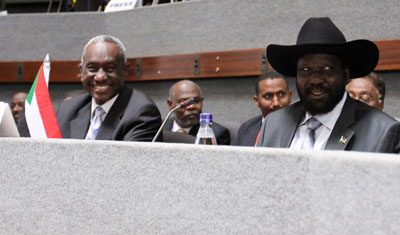
JUBA, Southern Sudan—East African leaders from seven nations convened in Nairobi, Kenya this week at an extraordinary summit of the Inter-Governmental Authority on Development, or IGAD, to focus on the challenges facing Sudan in the coming months, including implementation of the Comprehensive Peace Agreement and Sudan’s nationwide elections, set to occur next month.
Sudanese civil society activists and opposition politicians have protested the lack of freedom in the electoral process, neighboring governments (namely Eritrea and Egypt) have called for postponement of the polls, and international advocacy groups have declared nearly uniformly that the current political and security climate in Sudan cannot and will not permit free and fair elections. The IGAD summit is a crucial indicator of where Sudan’s neighbors stand, and yesterday’s statements shed light on the position of southern Sudan in the tense run-up to the polls.
Salva Kiir, president of the Government of Southern Sudan and first vice president of the Republic of Sudan, was unequivocal:
The people of southern Sudan attach more importance to the referendum than the elections. For them the right of self-determination is one of their biggest political achievements in the CPA and they will defend it at any cost.
President Kiir also sought to de-link the two major political processes set to occur in the next 10 months: “The conduct of the elections is not a pre-requisite to the conduct of the referendum,” he told the IGAD members.
IGAD has not held a meeting on Sudan since the CPA—which IGAD helped negotiate—was signed in 2005. For this reason, it may be too late for the regional body to seriously assist the Sudanese parties in efforts to make good on the promise of the CPA; it’s an understatement to say that the “democratic transformation of Sudan” called for in the CPA cannot happen overnight. The process needed to start immediately following the signing of the CPA, and yet regional attention and support for the agreement is only coming together at the eleventh hour. The event envisioned as a key exercise in the democratization process is now occurring—after two lengthy delays—in the shadow of the southern referendum, which, as the South’s leader declared yesterday, is undoubtedly the main event for one of the two Sudanese parties to the CPA.
Meanwhile, U.S. Special Envoy Scott Gration noted in an AP interview from Nairobi that while Sudan’s elections won’t be perfect, they “could still ‘reflect the will of the people.’”

